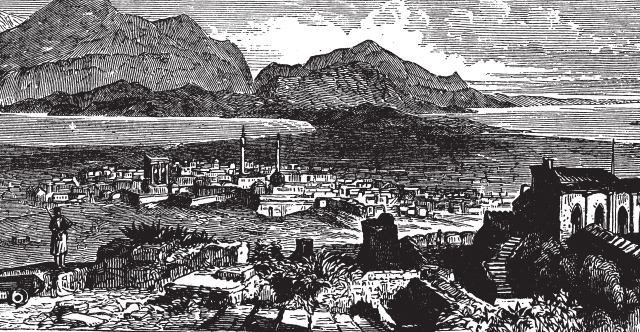
1
N
ow about food offered to idols: of course we know that all of us possess knowledge knowledge causes people to be puffed up (to bear themselves loftily and be proud), but love (affection and goodwill and benevolence) edifies and builds up and encourages one to grow.
Ora, no tocante
2
I
f anyone imagines that he has come to know and understand much, he does not yet perceive and recognize and understand as strongly and clearly, nor has he become as intimately acquainted with anything as he ought or as is necessary.
Se alguém cuida saber alguma coisa, ainda não sabe como convém saber.
3
B
ut if one loves God truly '> with affectionate reverence, prompt obedience, and grateful recognition of His blessing], he is known by God '> recognized as worthy of His intimacy and love, and he is owned by Him].
Mas, se alguém ama a Deus, esse é conhececido dele.
4
I
n this matter, then, of eating food offered to idols, we know that an idol is nothing (has no real existence) and that there is no God but one.
Quanto, pois, ao comer das coisas sacrificadas aos ídolos, sabemos que o ídolo nada é no mundo, e que não há outro Deus, senão um só.
5
F
or although there may be so-called gods, whether in heaven or on earth, as indeed there are many of them, both of gods and of lords and masters,
Pois, ainda que haja também alguns que se chamem deuses, quer no céu quer na terra (como há muitos deuses e muitos senhores),
6
Y
et for us there is one God, the Father, Who is the Source of all things and for Whom we, and one Lord, Jesus Christ, through and by Whom are all things and through and by Whom we.
todavia para nós há um só Deus, o Pai, de quem são todas as coisas e para quem nós vivemos; e um só Senhor, Jesus Cristo, pelo qual existem todas as coisas, e por ele nós também.
7
N
evertheless, not all possess this knowledge. But some, through being all their lives until now accustomed to idols, still consider the food as that sacrificed to an god; and their weak consciences become defiled and injured if they eat.
Entretanto, nem em todos há esse conhecimento; pois alguns há que, acostumados até agora com o ídolo, comem como de coisas sacrificadas a um ídolo; e a sua consciência, sendo fraca, contamina-se.
8
N
ow food will not cause our acceptance by God nor commend us to Him. Eating gives us no advantage; neither do we come short or become any worse if we do not eat.
Não é, porém, a comida que nos há de recomendar a Deus; pois não somos piores se não comermos, nem melhores se comermos.
9
O
nly be careful that this power of choice (this permission and liberty to do as you please) which is yours, does not become a hindrance (cause of stumbling) to the weak or overscrupulous.
Mas, vede que essa liberdade vossa não venha a ser motivo de tropeço para os fracos.
10
F
or suppose someone sees you, a man having knowledge reclining at table in an idol’s temple, might he not be encouraged and emboldened if he is weak and uncertain, and eat what is for the purpose of idol worship?
Porque, se alguém te vir a ti, que tens ciência, reclinado ã mesa em templo de ídolos, não será induzido, sendo a sua consciência fraca, a comer das coisas sacrificadas aos ídolos?
11
A
nd so by your enlightenment (your knowledge of spiritual things), this weak man is ruined (is lost and perishes)—the brother for whom Christ (the Messiah) died!
Pela tua ciência, pois, perece aquele que é fraco, o teu irmão por quem Cristo morreu.
12
A
nd when you sin against your brethren in this way, wounding and damaging their weak conscience, you sin against Christ.
Ora, pecando assim contra os irmãos, e ferindo-lhes a consciência quando fraca, pecais contra Cristo.
13
T
herefore, if food is a cause of my brother’s falling or of hindering, I will not eat flesh forever, lest I cause my brother to be tripped up and fall and to be offended.
Pelo que, se a comida fizer tropeçar a meu irmão, nunca mais comerei carne, para não servir de tropeço a meu irmão.
 English
English
 Albanian - Shqip
Albanian - Shqip
 Arabic - العربية
Arabic - العربية
 Bulgarian - Български
Bulgarian - Български
 Chinese - 汉语
Chinese - 汉语
 English - English
English - English
 French - Français
French - Français
 German - Deutsch
German - Deutsch
 Italian - Italiano
Italian - Italiano
 Māori - Te Reo Māori
Māori - Te Reo Māori
 Portuguese - Português
Portuguese - Português
 Romanian - Română
Romanian - Română
 Russian - Русский
Russian - Русский
 Somali - Af Soomaali
Somali - Af Soomaali
 Spanish - Español
Spanish - Español
 Ukrainian - Українська
Ukrainian - Українська
 Vietnamese - Tiêng Viêt
Vietnamese - Tiêng Viêt
 Portuguese
Portuguese
 Albanian - Shqip
Albanian - Shqip
 Arabic - العربية
Arabic - العربية
 Bulgarian - Български
Bulgarian - Български
 Chinese - 汉语
Chinese - 汉语
 English - English
English - English
 French - Français
French - Français
 German - Deutsch
German - Deutsch
 Italian - Italiano
Italian - Italiano
 Māori - Te Reo Māori
Māori - Te Reo Māori
 Portuguese - Português
Portuguese - Português
 Romanian - Română
Romanian - Română
 Russian - Русский
Russian - Русский
 Somali - Af Soomaali
Somali - Af Soomaali
 Spanish - Español
Spanish - Español
 Ukrainian - Українська
Ukrainian - Українська
 Vietnamese - Tiêng Viêt
Vietnamese - Tiêng Viêt
